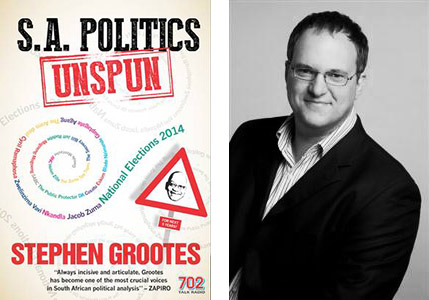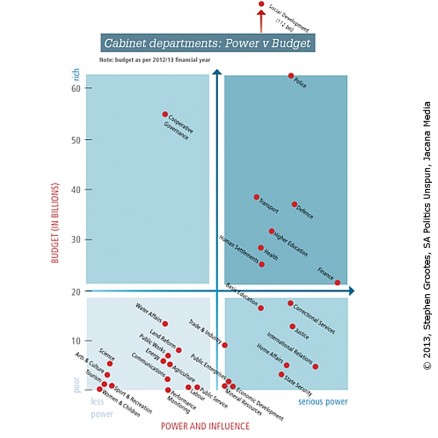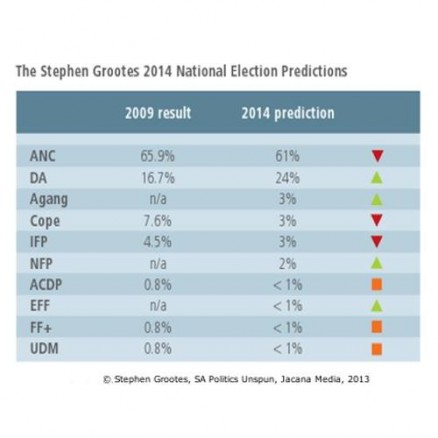
Back during South Africa’s “ancien régime”, included in their diplomatic staff, the bigger foreign embassies in this country almost always had political observers and analysts who specialized in either white politics, or black politics. The former spent their time trying to understand the arcane dynamics driving the splits between the verligtes and the verkramptes; while the latter puzzled over the finer distinctions between the ideas of the charterists and black consciousness advocates, or Inkatha versus the UDF. All of this to help predict what was likely to come next in the life of Africa’s economic giant, a mineral rich land that produced much more than its share of human rights violations, political turmoil and regional instability. It is a shame Stephen Grootes was not around back then so that he could have produced an earlier version of this book. Legions of diplomats, scholars, and foreign correspondents would have found such a work enormously helpful. As it is, this book will soon find a wide and receptive audience - it will quickly take its deserved place on many reference shelves.
Grootes has created a lively, readable guide to the major political figures, movements, institutions and issues that inhabit contemporary South Africa. Much more than just a useful collection of thumbnail portraits of the country’s leading politicians and political movements, the author has put them all in their respective contexts, decoding how and where the politicians fit into the nation’s political structures and the way the governing party’s impact is thoroughly interwoven with the national government’s structures.
Especially informative is a brief but precise exploration of the history and current relationships (and tensions) in the tripartite alliance, and the ways the personalities of the various leaders have generated the movement’s strengths or exacerbated its internal tensions. The incisive information on the SA Communist Party is especially welcome, given the relatively sparse background on the party in the more usual run of political journalism and the ahistorical way it is usually written about.
Scattered through the book, Grootes has included a number of graphic devices that are both eye-catching and thought provoking. To accompany the material on the ANC’s leadership, there is a graph that measures cabinet departments (and therefore their political leadership) along two axes: size of budget and policy importance. Similarly, for the ANC’s internal leadership, the graph tracks power within government versus power within the party.

The author does not hold back on more personal judgements either. Along with the short bios that offer illuminating personal background, Grootes provides judgements about the measure of each of these politicians – this one religiously returns phone calls and is unfailingly polite; another has a true mastery of the issues in his portfolio; that one is notoriously thin-skinned; while another seems fatally addicted to political controversies and expensive, bling-bling cars. Next to each name is another graphic that measures the politician’s power rating on a scale of one to ten as well as moral rectitude as a leader – also parsed out on a ten-point scale. Nine or ten points and the man (or woman) is a veritable rock; a one or a two is, well, you can just imagine.
Not content to offer only a current map of things, Grootes has included a political projection for the 2014 election as well. In the section on the various parties, he pins his colours to the mast as a political prognosticator. Grootes gives his best estimate on the political fortunes of virtually the entire spectrum of South African political parties – down to the last percentage point. In contrast to some who have projected the precipitous decline in ANC fortunes next time around and the dramatic rise of the Economic Freedom Fighters, Grootes calculates, thumb-sucks or reads some serious tea leaves (it is never quite sure where he gets his numbers from, tradecraft secrets, perhaps) to predict a gentle decline of ANC fortunes to around 61% of the voting electorate and its nearest rival, the DA, holding steady from the previous provincial election at around 24%. Everybody else will pick over the bones of the remaining 15%. Give the man a gold star for bravery – putting his views on the line eight months before the event in a way that he can’t possibly backtrack from once the actual voting has taken place.

It is uncanny how much this book reads like an audio version of the author’s thoughts. Grootes is omnipresent on South Africa’s airwaves as the host of 702 and 567’s Mid-Day Report, one of the most listened-to radio programs in the country and this entire book seems pitched in the author’s voice. As a result, the reader can easily imagine he is listening to Grootes reading the book’s chapters to audiences over the airwaves. It is an enticing combination of an authoritative delivery together with a near-total lack of holding back of the sharp verbal stick whenever he thinks someone’s position, words or behaviour in office is just a lot of unctuous, pious cant that deserves to be swatted away.
Especially since this book has included a whole range of predictions – who will rise in South African politics, who will fall, and which parties will gain how many votes, it just about begs to be re-issued in a revised edition a year from now, once the 2014 electoral results are counted. In that revised version, Grootes will undoubtedly get to explain why he was wrong - or crow about the correctness of his predictive capabilities. In fact, the book virtually begs to become a yearly volume, something along the lines of the yearly volume, the Almanac of American Politics. After a couple of editions, S.A. Politics Unspun will easily join the SA Institute of Race Relations’ annual, South Africa Survey (formerly the Survey of Race Relations), as a must-have publication, invaluable for embassies, journalists, businesses, the NGO world and any others who need to interpret and contextualize political developments, movements and figures. It is not too much of a leap to expect to find some of Grootes’ stock summings-up creeping their way into the lingo of many other reports as well, over time.
Despite this book’s high standard, there are a couple of questionable calls. The volume barely refers to Nelson Mandela, Winnie Madikizela-Mandela, or even retired Archbishop Desmond Tutu, except in the historical context. That seems a bit overly harsh, given the national debate over the Mandela legacy in the wake of his most recent health crisis, even after his withdrawal from the country’s public space some years earlier. In fact, much of the country’s public discourse still falls back on Mandela’s vision as its touchstone (or in an implicit disagreement with its sweeping racial inclusivity).
As such, it seems just a bit too early to ignore the impact of Madiba’s influence on today’s politics. In a comparative sense, it would have been impossible to write a volume about French politics in the early 1970s, several years after de Gaulle’s departure from power, without taking into account his continuing impact on the country’s political dynamics. In the same way, a volume on American politics into the 1990s would have had to incorporate an understanding of the Ronald Reagan's vision in the way it continued to animate the Republican Party years after The Gipper had departed from active political life.
Similarly, the book would have been even better for a more thorough discussion of the ideas behind the competing strains in South African political thinking (even if they do not have a formal major party presence at the moment). There could have been more attention to the ideas that have come through to the present time from the ideology of black consciousness versus the charterist and socialist traditions embodied in the UDF and now the ANC – or even the traditional Africanist views that also compete for attention in the modern ANC.
Moreover, the book would have also benefited from more thorough discussion of how politically crucial non-governmental actors such as the Treatment Action Campaign or Section 27 affect formal political activity and governance in South Africa. There might also be at least a brief nod towards the role and impact of the country’s business community (money is, after all, the mother’s milk of politics - both in legal and illegal guises), and the role of the media. This could usefully have included consideration of the growing impact of electronic social media, especially among the so-called “born free” generation now beginning to enter the political realm. The important role of the SABC as an arbiter of political ideas and as the locus of a struggle over whether every national institution must reflect the values of the governing party also deserves more than three paragraphs.
Further, to aim towards a fuller comprehensiveness, S.A. Politics Unspunwould have benefited from consideration of the nature of the political universe at the municipal level. Most of the country’s service delivery protests, after all, relate to the delivery – or lack of it – by local (or provincial) governments, rather than at the national level. Given reports that many of the country’s local government authorities are verging on the dysfunctional, some consideration of their impact on the citizenry and the way political parties are responding to this level of government would be helpful. This is especially true since future national leaders will almost certainly come from such governments, rather than as new legatees of the anti-Apartheid struggle or exile movements. A fuller understanding of how parties are recruiting, training and grooming such leadership for the future would be important to understand.
While it doesn’t really detract from the impact of this book, in his brief introductory history of South Africa, the author entirely slides past the early settlers’ encounters with the indigenous populations of the Western Cape – the Khoi and San. These encounters both set the pattern for the country’s political, economic and social fabric for three hundred years to come with European expansion into the interior – and established the Cape as a region with special features that stood it apart from the rest of the nation – thereby helping set the scene for today’s DA supremacy there. This belongs in Grootes discussion as well. Of course all of these additions would have added to the book’s girth, but they well add important insights into an already thoroughly useful volume.
Finally, it would also have been nice to know what sources – print publications, websites, broadcast media programs – Grootes finds most useful in his own efforts to stay at the top of his own chosen game [apart from Daily Maverick, of course, where he is the member of the original team that launched it, four years ago – Ed]. In the same way, a more thorough reading list of other writing beyond the one-page list of five or six recent volumes (important though these are) that the author has found crucial in developing his own understanding of South Africa’s political universe belongs in the next edition of this work. These modest quibbles aside, Grootes’ new book deserves to be on the reading list of everybody interested, involved in, or affected by South Africa’s political life – and that includes the politicians themselves.
Interestingly, when the author was asked about his own background in growing into the role of a political analyst, Grootes joked he had started as a politics major at Rhodes University, but then switched to journalism after achieving a less than lofty 50% pass in his first politics course. On that basis, he said, people might reasonably infer he is only half right in everything he has written in this new book. Not so. He deserves a much better grade than that – a solid first class pass - for skilfully wading into the difficult waters of South African psephology – the understanding and predicting of political behaviour, especially that of those often unpredictable voters.
Stephen Grootes' 'S.A. Politics Unspun', published by Two Dogs, an imprint of Burnet Media and distributed by Jacana Media, will shortly be in bookstores nationally.
[Disclosure: the reviewer is an occasional commentator on international affairs for Grootes’ Mid Day Report radio program and he relies upon Grootes for providing an understanding of the by-ways and highways of South African politics.]
 SLiPStellenbosch Literary Project
SLiPStellenbosch Literary Project 